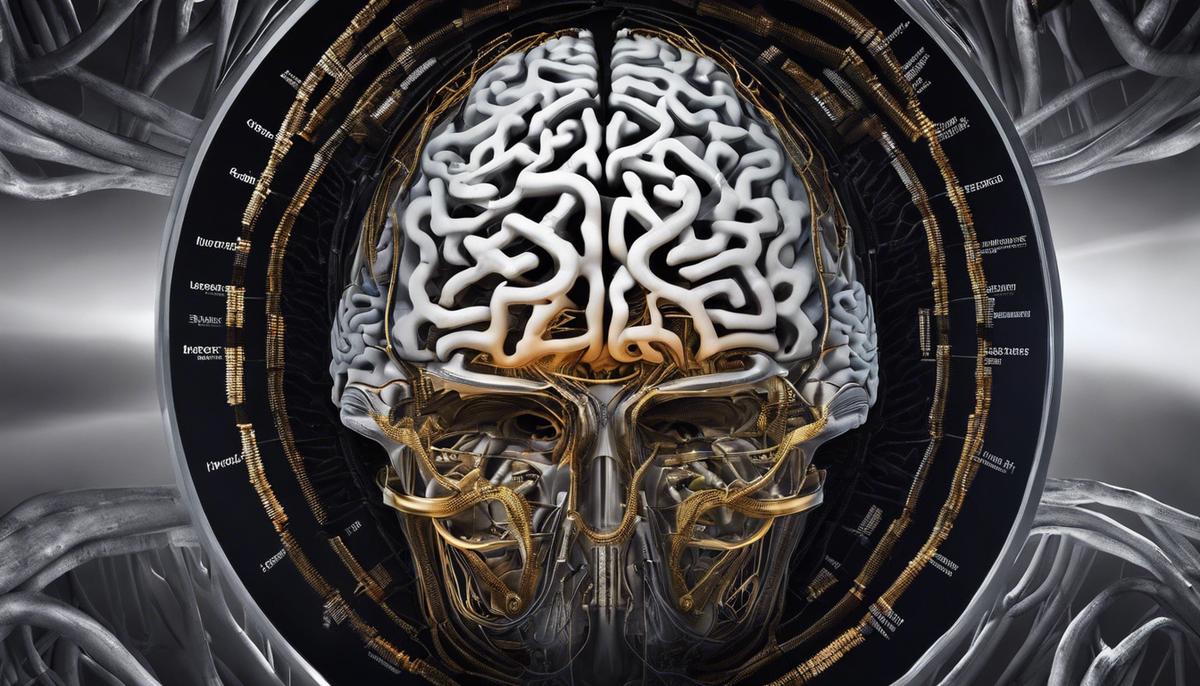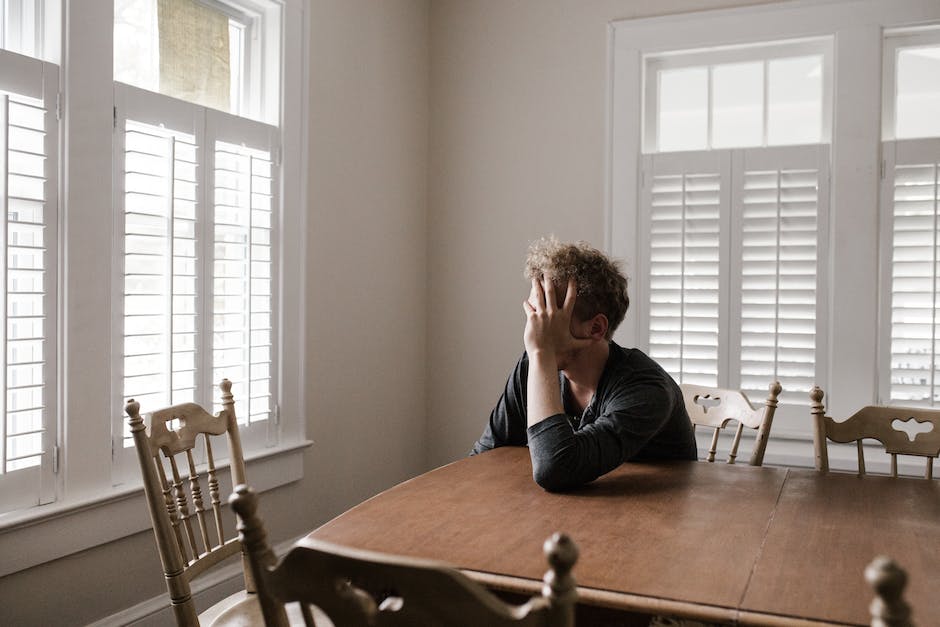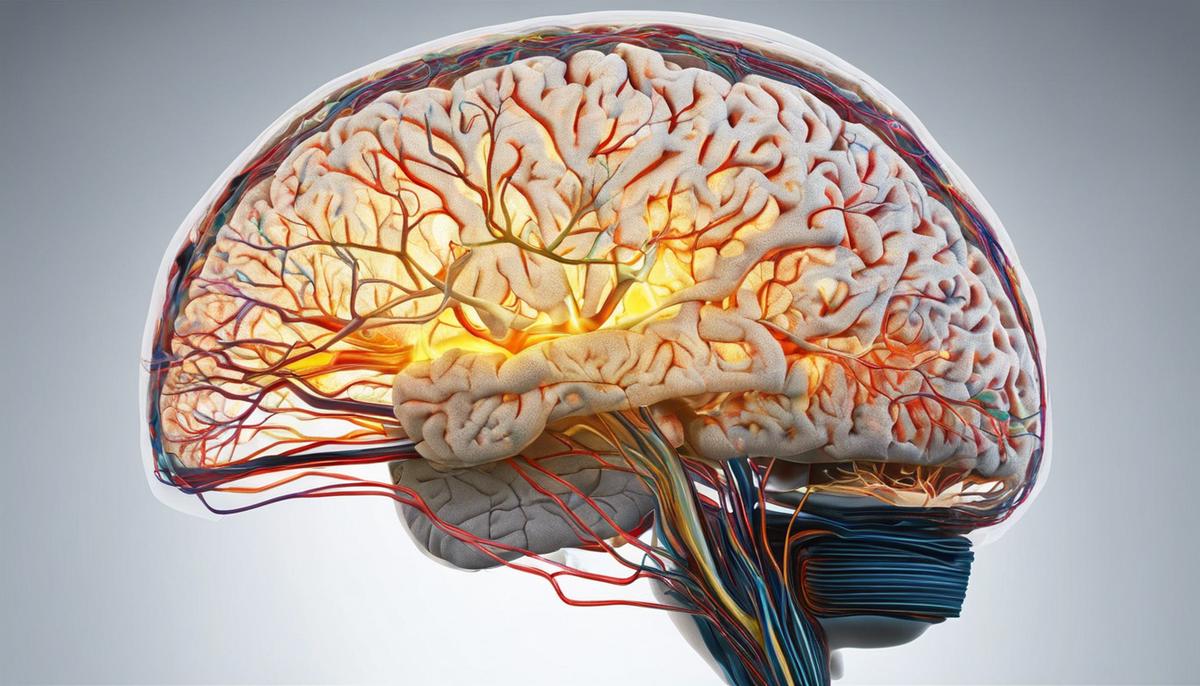Men are often silent carriers of the internal tumult that is anxiety, seldom revealing the full extent of their psychological turmoil amidst the clamor of societal expectations. With unique neurochemical tapestries that influence their emotional landscapes, men navigate anxiety’s choppy waters differently. The Neuroscience of Anxiety in Men peels back the layers of this complex state of being, probing into how testosterone, brain structures, and the HPA axis converge to craft the male experience of anxiety. As we pivot towards the Behavioral and Psychological Impact of Anxiety in Men, the article outlines a narrative of how this silent specter haunts their actions, thoughts, and overall wellbeing. Intrigued yet? Journey with us through the labyrinths of the male psyche as we unravel the tapestry of anxiety and chart a course towards resilience and mastery over this common, yet deeply personal, struggle.
The Neuroscience of Anxiety in Men
Anxiety in the Male Brain: A Discerning Exploration
In the cerebral landscape where psychological phenomena like anxiety take root, the neurologic patterns between genders have piqued the interest of the scientific community. Manifestations of anxiety within the male brain, despite superficial similarities to the female response, exhibit distinctive characteristics under close scrutiny. This article endeavors to delineate the unique pathways through which anxiety manifests in males.
Emerging research illuminates that societal expectations often dictate the outward presentation of anxiety in males. Cultural norms that promote stoicism can lead males to suppress emotional turmoil, potentially obscuring the conventional indicators of anxiety. In lieu of openly acknowledging their distress, men may exhibit irritability, avoidance behavior, or increased risk-taking as covert manifestations of anxiety.
Biologically speaking, the male brain processes stressors with a singular interplay of neurotransmitters and hormones, particularly testosterone. Testosterone has been shown to influence behavior and mood, playing a potential role in mitigating or exacerbating anxiety responses. Studies suggest that elevated testosterone levels might offer some semblance of resilience against stress, yet the complexity of hormonal regulation may also precipitate vulnerability in certain contexts.
The amygdala, a critical structure for emotion regulation, interacts differently with cortical brain regions in males compared to females, particularly under stressful conditions. The implications of these interactions for the expression and management of anxiety are fertile ground for inquiry. While the bulk of individuals experience anxiety, males may demonstrate a propensity towards a less conspicuous symptomatology, including cognitive symptoms such as incessant worry or unfounded fears, which may escape early detection and intervention.
Investigation into the neural circuitry of the male brain has also disclosed that men, when confronting anxiety-inducing stimuli, exhibit patterns of neural activity suggestive of a more pronounced fight-or-flight response. Such insights broaden the understanding of how men might differently engage with, or retreat from, stressors in their environment.
It is paramount to note that despite these tendencies, the male experience of anxiety is not monolithic and is influenced by numerous factors, including genetics, personality, and life experiences. Continuing to unravel the nuanced psychological fabric of anxiety in men is paramount to devising efficacious approaches to mental health that are sensitive to gender differences.
The study of anxiety’s manifestation in the male brain is a testament to the intricate interplay of biological, psychological, and social factors. As research delves deeper into this subject, it opens avenues for more nuanced treatments and a broader comprehension of how males cope with, and ultimately, overcome anxiety. This pursuit is undeniably steeped in complexity, yet the gains towards understanding and ameliorating human suffering present an endeavor of immeasurable value.

Behavioral and Psychological Impact of Anxiety in Men
Understanding the Weight of Anxiety on Male Mental Health: Beyond Visible Signs
In the contemporary discussion on mental health, particular emphasis must be devoted to the recognition and interpretation of anxiety’s impact on the intricate web of male psychological well-being. The consequences of anxiety are profound and multidimensional, affecting various facets of life for individuals across the male gender spectrum. This discourse aims to elucidate further the behavioral and psychological repercussions of anxiety on this demographic, expanding upon known themes with a specific focus on the subtler nuances that define male experiences of such disorders.
Delving into the behavioral domain, anxiety has been shown to significantly disrupt interpersonal relationships and work performance. Men with anxiety may experience difficulty cultivating and maintaining relationships, not solely due to overt symptoms but also because of an undercurrent of apprehension and distress that colors their interactions. This can yield a sense of isolation and a reticence to engage in social activities, perpetuating a vicious cycle of withdrawal and loneliness.
Furthermore, anxiety casts a long shadow over professional life, where males may battle with reduced concentration and decision-making capabilities. The resultant performance anxiety not merely impairs job-related tasks but also engenders a palpable impact on career trajectory, thereby compromising long-term vocational fulfilment and economic stability.
Psychologically, chronic anxiety takes its toll on self-perception, eroding self-confidence and fostering detrimental thought patterns. The internalised strain expressed by males grappling with anxiety often translates into a feeling of inadequacy, which can coalesce into a formidable obstacle that hampers personal growth and fulfillment. A pervasive sense of vulnerability may infringe upon the ability to assert oneself in various spheres of life or contrive an effective coping stratagem against day-to-day stressors.
Notably, anxiety can also serve as the nexus for co-morbid psychological conditions, such as depression and substance abuse, in men. This intersectionality elucidates the significance of recognizing anxiety not as a standalone entity but as a potential precursor or co-contributor to an array of psychological challenges.
Anxiety’s influence on the male psyche necessitates a robust support system that extends beyond the individual, encompassing societal attitudes, workplace culture, and healthcare provisions attuned to gender-specific needs. The destigmatization of male mental health issues and the promotion of psychological resilience-building are critical in cultivating a supportive environment conducive to the amelioration of anxiety-induced suffering.
In conclusion, the understanding of anxiety and its ramifications on male well-being demands an exploration into the often unseen intricacies of behavioral and psychological distress. Such insights pave the path toward more empathetic and effective approaches, empowering males to navigate the tumultuous terrain of anxiety with informed resilience.

Photo by jacklucassmith on Unsplash
Evidence-Based Anxiety Management Strategies
Effective Management of Anxiety in Men: Evidence-Based Techniques
Anxiety disorders, which entail a constellation of symptoms manifesting as excessive fear and worry, are remarkably prevalent in men, though their presentation often eludes the traditional diagnostic paradigms framed by empirical research. With an understanding of the unique ways these disorders impact men, interventions tailored to alleviate anxiety in this demographic warrant exploration, unpacking an assortment of evidence-based modalities conducive to male patients.
Cognitive Behavioral Therapy (CBT), with a compendium of empirical support, emerges as a formidable approach, assuaging symptoms through the restructuring of maladaptive thought patterns and the cultivation of adaptive behaviors. This approach, particularly when focusing on the modification of thought processes and responses to stress, has manifested repeatedly as an efficacious strategy to attenuate anxiety.
Mindfulness and stress-reduction techniques present additional, scientifically vetted approaches. Mindfulness-Based Stress Reduction (MBSR) is a structured program that amalgamates mindfulness meditation and yoga to promote mental equanimity. Whereas men may not always voluntarily engage in such practices, those who do often report reduced symptoms of anxiety.
Physical exercise, with its inherent capacity to induce neural growth and foster neurochemical balance, is advocated as an adjunct or primary modality for reducing anxiety symptoms. Aerobic exercise, for example, is supported by a wealth of research indicating its positive effects on mood and anxiety levels.
Medication also forms an integral component of the treatment constellation, with selective serotonin reuptake inhibitors (SSRIs) and benzodiazepines frequently prescribed. While medication may offer relief, particularly for acute anxiety, long-term management often necessitates a more holistic approach, taking into account lifestyle and behavioral factors.
Exposure therapy, a derivative of CBT methodologies, utilizes the systematic exposure to the anxiety-provoking stimuli to extinguish the conditioned response of fear. Especially relevant to men, who may eschew the expression of vulnerability, exposure therapy can incrementally build tolerance to stressors, effectively decreasing the physiological and psychological response to anxiety.
Moreover, group therapy provides a platform for supportive interpersonal exchanges, fostering a sense of community and reducing the isolation often accompanied by anxiety. The normalization of shared experiences can be particularly therapeutic, as it confronts the erroneous notion that seeking help is indicative of frailty.
Digital health interventions – an expanding frontier – offer additional promise, presenting tools like online CBT programs or apps that can deliver stress management techniques, often appealing to men who might hesitate to seek in-person assistance.
An integrative framework, combining these various techniques, has the potential to form a robust arsenal against anxiety in men. Acknowledging that men might engage with mental health services differently necessitates adaptive, accessible, and male-focused interventions to permit effective engagement with treatment paradigms.
Progress in techniques for managing anxiety in men hinges not only upon the refinement of these evidence-based interventions but also upon a shift in societal norms that allows men to openly address and manage their mental health without stigma or reservation. Such progress will pave the way for improved well-being and quality of life among those afflicted with this common, yet occasionally elusive, psychological challenge.

Lifestyle Adjustments and Preventive Measures
The relationship between lifestyle modifications and the mitigation of anxiety among males is undeniably pertinent. While previous sections have diligently explored various dimensions of anxiety’s manifestation and treatment, a crucial factor remains to be discussed: the proactive role lifestyle changes can play in the prevention and reduction of anxiety symptoms in men.
Regular physical activity, esteemed for its cardiovascular benefits, emerges as a potent antidote for anxiety. Exercise triggers the release of endorphins, often referred to as “feel-good” hormones, which can elevate mood and provide a natural buffer against stress. Furthermore, engagement in physical activities provides structured routines and can foster a sense of mastery and achievement, which might directly oppose the incapacitating effects of anxiety.
Nutrition interface with mental health is increasingly recognized. Men’s dietary patterns, including the intake of omega-3 fatty acids, vitamins, and minerals, have been linked with brain health. A balanced diet can have an ancillary benefit in stabilizing mood and diminishing anxiety symptoms. Specifically, the regulation of caffeine and alcohol, substances that may exacerbate anxiety episodes, is paramount.
Sleep must not be understated when discussing lifestyle adjustments. Not only is sleep deprivation associated with heightened anxiety levels, but it can also significantly impair cognitive function and emotional regulation. Establishing consistent sleep patterns and creating a conducive sleep environment is pivotal in cultivating both mental and physical well-being.
Stress management techniques, such as deep-breathing exercises, progressive muscle relaxation, or guided imagery, are potent tools. These methods foster a parasympathetic response, the body’s natural relaxation reflex, countering the hyperarousal state often encountered in anxiety.
Lastly, the cultivation of social connections is fundamentally protective against a host of mental health challenges, including anxiety. Men’s engagement in community, whether through formal means like clubs and organizations, or informal means such as friendships and familial ties, can stave off the isolating impact of anxiety. These bonds offer support, a sounding board for concerns, and a buffer against life’s stressors.
Acknowledging the immense potential of lifestyle modifications offers a proactive approach, whereby men are empowered to incorporate healthful practices into their daily lives, possibly forestalling the onset of anxiety or diminishing its severity. The intersection of these lifestyle realms — physical activity, nutrition, sleep, stress management, and social engagement — with a man’s unique psychological constitution forms a comprehensive framework to advance not only the understanding of male anxiety but also a tangible, actionable roadmap for its prevention and alleviation.

The Role of Social Support and Community in Managing Male Anxiety
Social Support as a Fundamental Pillar in Mitigating Anxiety Among Men
It has become increasingly evident that the provision of adequate social support is indispensable in the mitigation of anxiety levels among men. Being enmeshed in a network of supportive relationships acts as a psychological buffer, attenuating the magnitude of stress and anxiety experienced by an individual. Empirical research substantiates the assertion that social bonds—whether originated from familial ties, friendships, or support groups—contribute substantially to the emotional well-being of men grappling with anxiety.
Within the context of these networks, individuals obtain emotional reassurance, which is pivotal in bolstering their sense of self-worth and competence. Such emotional nourishment can manifest through simple acts of listening, affirming, and empathizing, which help men feel understood and less isolated in their struggles. Furthermore, social support often leads to the practical assistance in dealing with day-to-day stressors, thereby reducing the overall load of responsibilities that can exacerbate anxiety.
Equally important is the exchange of information within social support networks, which can guide men towards appropriate coping strategies and professional resources. The sharing of personal experiences and solutions can demystify the process of seeking help, thus encouraging men to engage in proactive management of their mental health.
Peer influence and modeling, embedded within social interactions, can also play a significant role. Observing peers successfully coping with anxiety can instill hope and impart practical methods of managing similar situations. Such modeling is critical in challenging and reshaping maladaptive thought patterns associated with anxiety.
It is crucial to note, however, the quality of social support is of paramount importance; supportive relationships should be nonjudgmental and foster a climate where vulnerability is respected rather than stigmatized. Suboptimal social support may, conversely, intensify anxiety by reinforcing negative self-perceptions or facilitating avoidance behaviors.
In conclusion, while personal and biological factors are instrumental in shaping male anxiety, it is undeniable that social support serves as a vital component in the holistic approach to managing anxiety among men. A supportive social environment, rich with compassion, understanding, and applicable assistance, can ameliorate the debilitating effects of anxiety, fostering a path towards recovery and resilience.

As we have explored the profound impact anxiety can have on the male psyche, from its neuroscientific underpinnings to the pivotal role of social support, one must acknowledge that managing anxiety is far from a solitary endeavor. It is a journey that calls for an arsenal of strategies – both clinical and lifestyle-based – together with the unwavering support of community and relationships. Through understanding and action, fostering psychological resilience becomes not just an individual quest but a collective triumph. The courage to confront anxiety’s multifaceted challenges is bolstered by knowledge, empathy, and the shared experiences that remind us that we are not alone in this fight. Let us continue to break the silence surrounding men’s mental health and advocate for a culture where seeking help is not a sign of weakness but a testament to strength.
